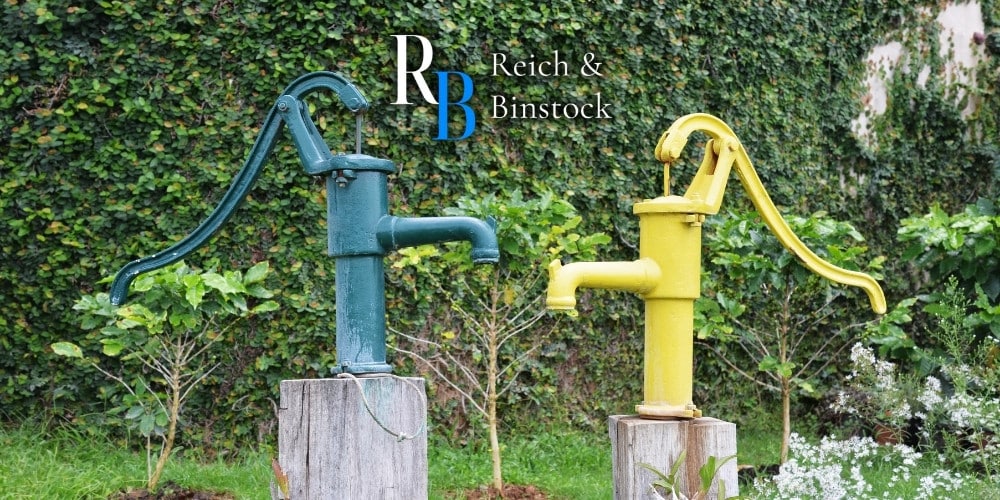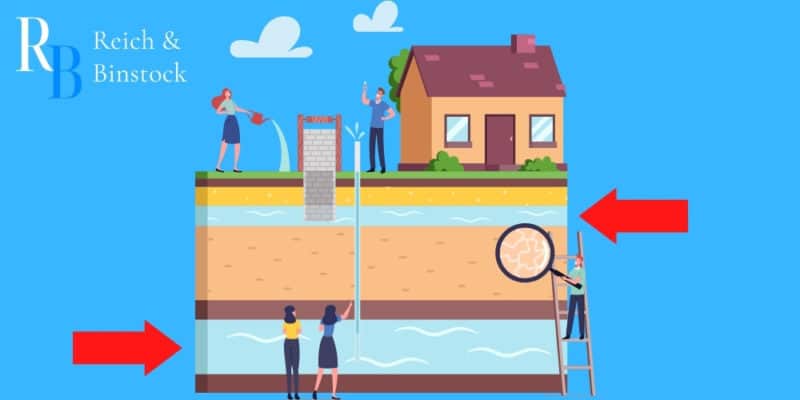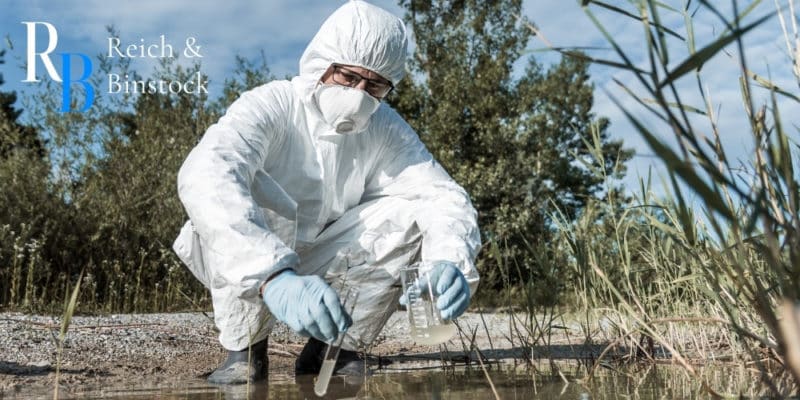Ground Water Pollution Lawsuit
PRACTICE AREAS
Groundwater Contamination Litigation

Cases of contaminated groundwater and other sources of drinking water have gained an increasing amount of attention in recent years. For example, the Flint, Michigan water crisis lasted for nearly half a decade. This means that the citizens of Flint did not have clean drinking water during that time. The crisis was completely preventable and resulted in up to 12,000 children being exposed to lead in their drinking water, nearly 80 lawsuits, and a host of other consequences. When negligence and carelessness enter the equation, drinking water sources can become compromised. Groundwater contamination cases can quickly get out of hand.
When this happens, those affected have every right to file a claim for any adverse health effects they suffered from the groundwater contaminants. Reich & Binstock has extensive experience handling water contamination lawsuits resulting from various sources, such as uncontrolled hazardous waste sites, hydraulic fracturing, and other sources. If you or someone you love has been affected by contaminated groundwater, please call our office at 713-622-7271 today to schedule your free consultation with us.
Laws and Regulations for Clean Water
Several laws enforce certain standards for drinking water quality and water treatment systems. The Environmental Protection Agency (EPA) sets these standards and enforces these regulations for various drinking water contaminants, such as organic contaminants, hazardous chemicals, heavy metals, and other toxic substances. Below, we outline a few of the most important regulations when it comes to water quality.
The Clean Water Act
The Clean Water Act was first enacted in 1948, but was greatly expanded and amended in 1972. It essentially regulates the standards of quality for surface water, as well as the discharge of certain pollutants into the water supply of the United States. It also sets standards for wastewater for industrial businesses.
The Safe Drinking Water Act
The Safe Drinking Water Act (SDWA) was first enacted in 1974. It allows the Environmental Protection Agency to set standards for drinking water quality in the United States. It also gives them the authority to oversee state and municipal water supplies for the enforcement of those standards. Another benefit of the SDWA is that it allows the EPA to set maximum safe levels for contaminants. Lastly, water authorities have requirements for the treatment of more than 90 contaminants that may find their way into the water supply.
What Is Groundwater?
As the name suggests, groundwater is found beneath the surface of the ground, within the spaces between rocks and soil. It is not to be confused with surface waters. Groundwater supplies around 51% of the total population of the United States with drinking water. Additionally, ground water supplies around 99% of the entire rural population of the United States. In other words, our nation greatly depends on this naturally-occurring water source.
Groundwater wells and underground storage tanks supply water not only for drinking, but also for irrigation, industrial processes, and even other sources of water. It contributes to the natural processes of recharging rivers, streams, lakes, and even wetlands. Therefore, groundwater contamination of any kind can be absolutely devastating for municipalities and human health.
What Is Groundwater Pollution?
Groundwater contamination or pollution can occur when any toxic chemicals make their way into the water supply. Examples of toxic chemicals include gasoline, road salts, oil, and other man-made substances. A toxic chemical may make its way into the groundwater through the soil, through polluted rain, leaks, and even runoff.
What Causes Groundwater Pollution?
There are many potential causes of groundwater contamination, most of them chemical in nature. Whether those chemicals are man-made or naturally occurring, it may be difficult to visually detect any pollution. This is because, as groundwater makes its way through the soil, it filters out many particles. However, many chemicals and heavy metals will dissolve in the water, resulting in those contaminants being found in high concentrations later. Below, we list some potential sources of contaminated groundwater.
- Leaking underground storage tanks
- Septic tanks with poor design or construction
- Uncontrolled waste sites
- Leaky landfills
- Road salts, fertilizers, pesticides, and herbicides
- Chemicals in the atmosphere that come from cooling towers or other sources
What Is the Most Common Groundwater Contaminant?
Nitrate is the most common contaminant in both aquifers and groundwater. When nitrate levels become too high, they can cause significant health problems for the human body. Elevated levels of nitrate can come from several sources, including agricultural runoff, sewage disposal, and sanitation.
What Are the Sources of Groundwater Contamination?
Because water is a universal solvent, this makes it more vulnerable to pollution than other solvents. It easily dissolves a high number of chemicals and other substances, which can be detrimental to human health if ingested. Some of the most common sources of groundwater contamination include the following.
- Waste: Although the United States processes billions of gallons of wastewater each day, it simply cannot keep up with the sheer volume of wastewater produced daily. This means that most wastewater ends up flowing back into the environment without receiving treatment.
- Leaking landfills: Solid waste from municipalities and cities is dumped into landfills, which are designed to prevent leakage into the surrounding area. However, landfills aren’t perfect containers of pollution. Sometimes, toxic leakage seeps through the lining and into nearby groundwater.
- Air pollution: Even pollution in the air can contribute to groundwater contamination. Both the air and groundwater are part of the important water cycle. Pollution in the air can fall back to earth in the form of acid rain, which can lead to groundwater contamination.
- Fuel-burning: The burning of various types of fuel also contributes to air pollution, which contributes to contaminated groundwater.
- Septic systems: Leaking septic tanks and septic systems can lead to drinking water contaminated with pathogens, chemicals, and other contaminants.
- Pesticides and herbicides: Agricultural runoff of herbicides and pesticides is a large source of water supply contamination. Although not all agricultural chemicals pose a health risk to humans, many are known or suspected human carcinogens.
- Animal waste: Waste and fecal matter from animals is another deadly pollutant for drinking water. Two common sources of animal waste come from dairy and poultry farms.
What Are the Effects of Groundwater Pollution?
Drinking water contamination has the potential to greatly affect thousands, if not hundreds of thousands of people. Specifically, this issue could result in poor quality drinking water, loss of water supply, high costs for cleanup, degraded surface water, and serious health risks. What’s more, is that the contamination of groundwater often goes unnoticed for a long time. This makes cleanup of contaminated drinking water very expensive and very difficult, if it is possible at all.
Consequences of Groundwater Contamination
What happens if you drink contaminated water? Certain negative health effects are common when people are exposed to contaminated drinking water. Some of the most common problems we see include the following.
- Organ damage
- Gastrointestinal problems
- Skin discoloration
- Nervous system damage
- Reproductive issues
- Cancer
- Vomiting
- Stomach pain
- Diarrhea
- Kidney failure
- Headaches
- Fever
How Does Pollution Affect Groundwater?
Different types of pollution can have different effects on groundwater contamination. For example, high levels of air pollution can lead to acid rain, which can deposit chemicals into the groundwater. Additionally, harmful diseases and viruses can make their way into drinking water via runoff and leakage. Some examples of illnesses that can contaminate groundwater include cholera and hepatitis. Pollution of any kind can ultimately find its way into groundwater sources, which can then lead to serious problems for human health.
Have You Suffered from Groundwater Contamination?
At Reich & Binstock, we believe that our natural resources are sacred. Groundwater contamination is a serious problem that the United States faces, and our attorneys are here to combat its effects. Public health heavily depends on both water availability and water quality. When negligence or carelessness results in the contamination of your drinking water, you and your family may experience negative health effects. If you have been negatively affected by prolonged exposure to contaminated water, you may be eligible for compensation. Please contact a water contamination lawsuit attorney with our firm today to schedule your free case evaluation. You can call our office at 713-622-7271 or fill out our online intake form below.
There is never a fee unless we recover on your behalf.

















